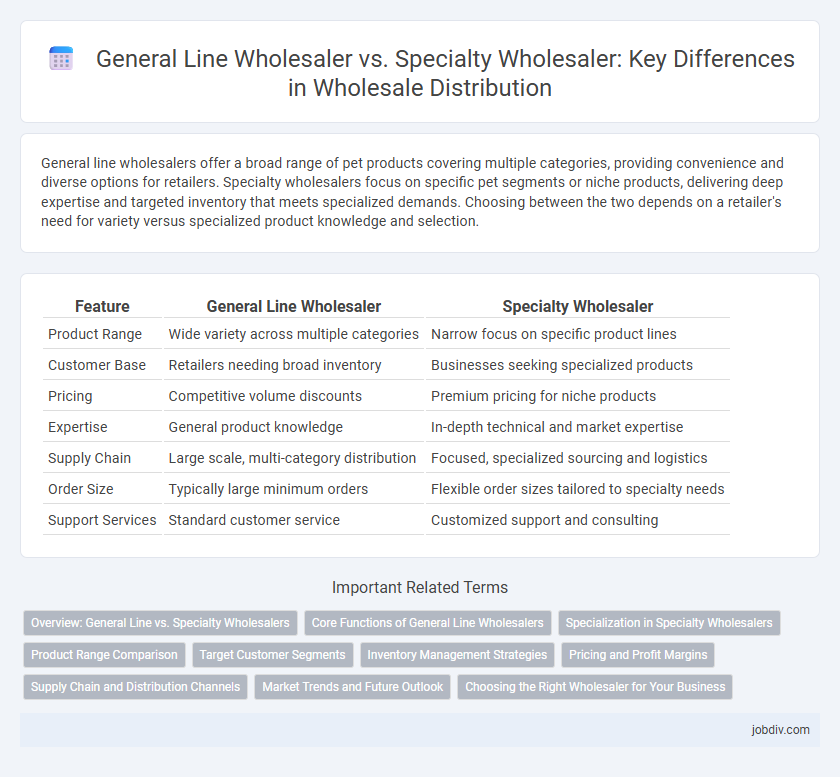General line wholesalers offer a broad range of pet products covering multiple categories, providing convenience and diverse options for retailers. Specialty wholesalers focus on specific pet segments or niche products, delivering deep expertise and targeted inventory that meets specialized demands. Choosing between the two depends on a retailer's need for variety versus specialized product knowledge and selection.
Table of Comparison
| Feature | General Line Wholesaler | Specialty Wholesaler |
|---|---|---|
| Product Range | Wide variety across multiple categories | Narrow focus on specific product lines |
| Customer Base | Retailers needing broad inventory | Businesses seeking specialized products |
| Pricing | Competitive volume discounts | Premium pricing for niche products |
| Expertise | General product knowledge | In-depth technical and market expertise |
| Supply Chain | Large scale, multi-category distribution | Focused, specialized sourcing and logistics |
| Order Size | Typically large minimum orders | Flexible order sizes tailored to specialty needs |
| Support Services | Standard customer service | Customized support and consulting |
Overview: General Line vs. Specialty Wholesalers
General line wholesalers supply a broad range of products across multiple categories, catering to diverse retail markets and streamlining procurement processes. Specialty wholesalers focus on a specific product category or industry niche, offering in-depth expertise, tailored services, and specialized inventory to meet targeted customer demands. Both models optimize distribution channels but differ in scope, with generalists prioritizing variety and specialists emphasizing product knowledge and customization.
Core Functions of General Line Wholesalers
General line wholesalers play a crucial role in the wholesale industry by offering a broad assortment of products across multiple categories, enabling retailers to source diverse inventory from a single supplier. Their core functions include bulk purchasing, inventory management, and efficient distribution, which streamline supply chains and reduce costs for retailers. These wholesalers also provide essential services such as credit financing, market information, and sales support, enhancing overall market accessibility and operational efficiency.
Specialization in Specialty Wholesalers
Specialty wholesalers focus on specific product categories or industries, providing in-depth expertise and tailored services that general line wholesalers often cannot match. Their specialization allows for better inventory management, targeted marketing strategies, and stronger supplier relationships within niche markets. This specialized approach enhances product quality control and customer satisfaction in sectors like electronics, pharmaceuticals, or organic foods.
Product Range Comparison
A general line wholesaler offers a broad product range across multiple categories, catering to diverse retail needs with items such as groceries, household goods, and electronics. Specialty wholesalers focus on a narrow product range, providing in-depth expertise and specialized inventory like medical supplies, automotive parts, or gourmet foods. This focused assortment allows specialty wholesalers to deliver superior product knowledge, tailored services, and enhanced inventory management within their niche markets.
Target Customer Segments
General line wholesalers serve a broad range of retail customers across multiple industries, offering diverse product categories to meet varied inventory needs. Specialty wholesalers target specific market segments or niche industries, providing specialized products and expertise tailored to particular customer demands. By focusing on defined customer segments, specialty wholesalers enhance value through deep product knowledge and customized service.
Inventory Management Strategies
General line wholesalers maintain diverse product inventories across multiple categories, emphasizing broad market coverage and volume sales, which requires sophisticated inventory forecasting and dynamic stock replenishment techniques to avoid overstocking or stockouts. Specialty wholesalers focus on niche markets with specialized products, employing targeted inventory management strategies such as just-in-time replenishment and closer supplier relationships to optimize stock levels and reduce holding costs. Effective inventory management in both types leverages data analytics and demand forecasting to enhance efficiency and meet customer expectations in competitive wholesale environments.
Pricing and Profit Margins
General line wholesalers offer a wide variety of products, enabling bulk purchasing discounts that result in lower pricing but tighter profit margins. Specialty wholesalers focus on niche markets, allowing for premium pricing due to specialized inventory and expertise, which often generates higher profit margins. Pricing strategies in each model align with their inventory breadth, impacting overall profitability and customer targeting.
Supply Chain and Distribution Channels
General line wholesalers handle a broad range of products, streamlining supply chain operations by consolidating inventory from multiple manufacturers, thus optimizing distribution channels for diverse retailers. Specialty wholesalers focus on niche markets, enabling tailored supply chain strategies that enhance product expertise and customized distribution networks. Both models impact supply chain efficiency and channel specificity, influencing speed, cost, and market reach.
Market Trends and Future Outlook
General line wholesalers dominate the market by offering a broad product range, catering to diverse industries and ensuring steady demand amid fluctuating economic cycles. Specialty wholesalers focus on niche sectors, leveraging expertise and customized services to capture emerging trends such as sustainable products and technological innovations. Market forecasts indicate specialty wholesalers will experience higher growth rates due to increasing consumer preference for specialized goods and personalized supply chain solutions.
Choosing the Right Wholesaler for Your Business
Selecting the right wholesaler impacts profitability and supply chain efficiency; general line wholesalers offer a broad product range suitable for businesses seeking variety, while specialty wholesalers provide expertise and niche products ideal for targeted markets. Analyzing product diversity, pricing structures, and supplier reliability helps businesses align their purchasing strategy with market demands. Effective wholesaler choice enhances inventory management, reduces costs, and strengthens competitive advantage in wholesale distribution.
General Line Wholesaler vs Specialty Wholesaler Infographic

 jobdiv.com
jobdiv.com